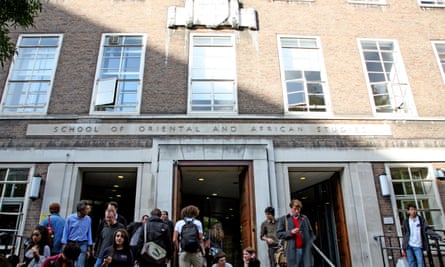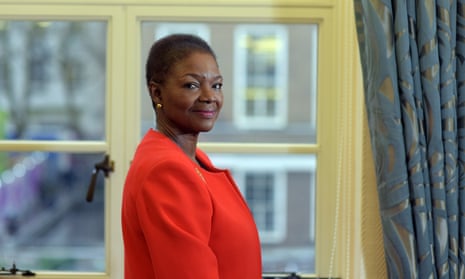The curious thing about Valerie Amos is most people have never heard of her and those who have can’t quite put their finger on what she’s done. In fact, her achievements are staggering. When she became international development secretary in 2003, she was the first British cabinet minister from an African-Caribbean background. Now, newly installed at age 61 as director of London University’s School of Oriental and African Studies (Soas), she is the first black woman to head a UK university. She has been leader of the House of Lords, high commissioner to Australia and, despite being a Labour life peer, was recommended by David Cameron for a top UN post as undersecretary general for humanitarian affairs.
She ought, you feel, to be an inspiration for young black Britons and a prominent spokesperson for their hopes, fears and frustrations. It is not her style, however, to seek the limelight or play to the gallery. She is a doer, not a publicist.
She declines to comment directly on David Cameron’s remarks about the failure of universities, particularly Oxford, to recruit young black men. Instead, she refers me to the Amos bursary, which she established with her younger sister in 2009 in memory of their parents, both former teachers who died that year. It recruits talented students “who have excelled academically at school and have not allowed personal circumstances, or the pressures of inner-city living, to cloud their vision or hamper their dreams”. It has provided not only financial support but also mentoring for several dozen students. Amos names “financial constraints, lack of understanding of the system, families without a strong tradition of higher education and little knowledge of what is required at degree level” as among the constraints that hold back black students.
Brought by her parents from her native Guyana to the then almost wholly white south-east London suburbs when she was nine, Amos began as an outsider, the only black pupil in her girls’ grammar school. Her subsequent career turned her into an insider. In a decade as a Labour minister – among other things, she was Africa minister, a job that involved visiting Cameroon, Angola and Guinea, then temporary members of the UN security council, to get them to support the invasion of Iraq – she provoked not the smallest ripple of controversy, never rocked the boat, or spoke a word out of place. Everyone who worked with her vouches for her competence, hard work and talent for diplomacy. “Everyone likes Valerie,” noted her fellow minister David Blunkett in his diary.
In these troubled times, the directorship of Soas, a university with students and lecturers of various ethnicities from across the world, could be the hottest of hot potatoes. Amos seems unfazed. When I ask her about Cameron’s claim in the autumn that Soas, along with several other universities, allowed “extremist” Muslim preachers to address meetings, she speaks with precision and care.
“The prime minister’s comments,” she says, “were made on the basis of inaccurate data. Only one of the preachers he identified spoke here and that was about Islamic finance. As a university, we have a responsibility to operate within the law. We have robust policies and procedures agreed with our students’ union.”
She is clearly sceptical of Prevent, the government’s counter-terrorism strategy, but reluctant to criticise it directly. Ministerial guidance calls on universities to “consider carefully” whether visiting speakers are likely to express views “that risk drawing people into terrorist groups”. Amos says: “It is very important to take our reading from the legislation. That is what parliament has agreed. It is very, very important that universities can have challenging debates and critical inquiry within the boundaries of what is legal.”
She continues: “One of the problems with the debate round Prevent is that, although the legislation applies to any kind of extreme behaviour, the whole way it is discussed is in relation to Muslims and Islam. We have to be much, much more sensitive to the broader environment. We have students who have faced harassment, sometimes on their way into the university or leaving it. There’s huge concern among those students that Prevent is feeding into that. They feel they are being particularly targeted.”
I mention another controversy, about whether to remove the statue of Cecil Rhodes at Oriel College, Oxford, because he was a racist colonialist. “I am not expressing a view about what’s happened in Oxford.” But what if someone demanded the demolition of Soas’s Brunei gallery, named after the Sultan of Brunei, a substantial donor but hardly a liberal democrat? Or wanted to change the school’s name because “oriental” for some is Eurocentric and offensive? “We would debate it. That’s how we work.”

Cool, measured and elegant, Amos speaks the unexciting language of bureaucrats, and asking her questions is like playing a slow game of tennis from the baseline. When I ask if she had ever considered herself very leftwing, she repeats “leftwing” as though it were an unexploded nuclear device, saying she’d admit to being “left of centre”.
Amos happily accepts the description of being a bureaucrat. “When you’re running things,” she says, becoming unusually animated, “the operational side of it is often as important as the leadership element. People often look at a politician and don’t think you’re any good at running things. I think I am good at that.”
Her first full-time jobs were in London local government, much of it then controlled by the “loony left”. “I was in advisory positions, first on race, then on gender. I wanted to get into management. I was giving all this advice to people but didn’t know how easy or hard it was to implement. I got a job in training and development, then became head of management services and really got an understanding of how difficult it is to bring about change.”
Her big breakthrough came in 1989 when she was appointed chief executive of the Equal Opportunities Commission. The commission’s previous chief executives had been on their last jobs before retirement. Amos transformed it, giving it a far more active and aggressive role. For example, she challenged the government through judicial review on rules that gave part-time workers full employment protection only after five years, but full-timers after two. This, she pointed out, discriminated against women, who accounted for 90% of part-timers. She won the case. “We were wholly funded by the government but were taking it to court on a pretty regular basis.”
She wasn’t a member of any political party – or if she was, she isn’t letting on – until she joined Labour when Tony Blair made her a baroness in 1997. But she offers a few titbits pointing to a radical youth. She chose to read sociology at Warwick University because its course was “cutting-edge”, allowing her to study the sociology of gender and of developing societies. She took an MA in cultural studies at Birmingham University because the department was run by the Jamaica-born guru Stuart Hall, founding editor of New Left Review. But she evidently wasn’t a firebrand. This was an era when students frequently occupied university buildings and howled down visiting speakers. Amos can only recall taking part in a rent strike.
Later, she jointly wrote a paper on Challenging Imperial Feminism, published in Feminist Review. It criticised white feminists for racism, arguing that many gains made by white women “have been and still are at the expense of black women”; that white, middle-class women in the peace movement shouted “Yanks out” at black American soldiers; that it wasn’t for white feminists to judge arranged marriages; and that the Reclaim the Night campaign encouraged whites to form vigilante groups that “protected” white women by “beating up black men”. The paper still appears on the reading lists of many women’s studies courses.
Would she stand by those judgments? Again, the reply is impeccably uncontroversial: “It was written over 30 years ago. Analysis of race was absent from feminism. The discourse today is more nuanced and issues of race are part of it.”
Amos says her youthful ambition was to change the world. Under the radar, she has realised it.

Comments (…)
Sign in or create your Guardian account to join the discussion